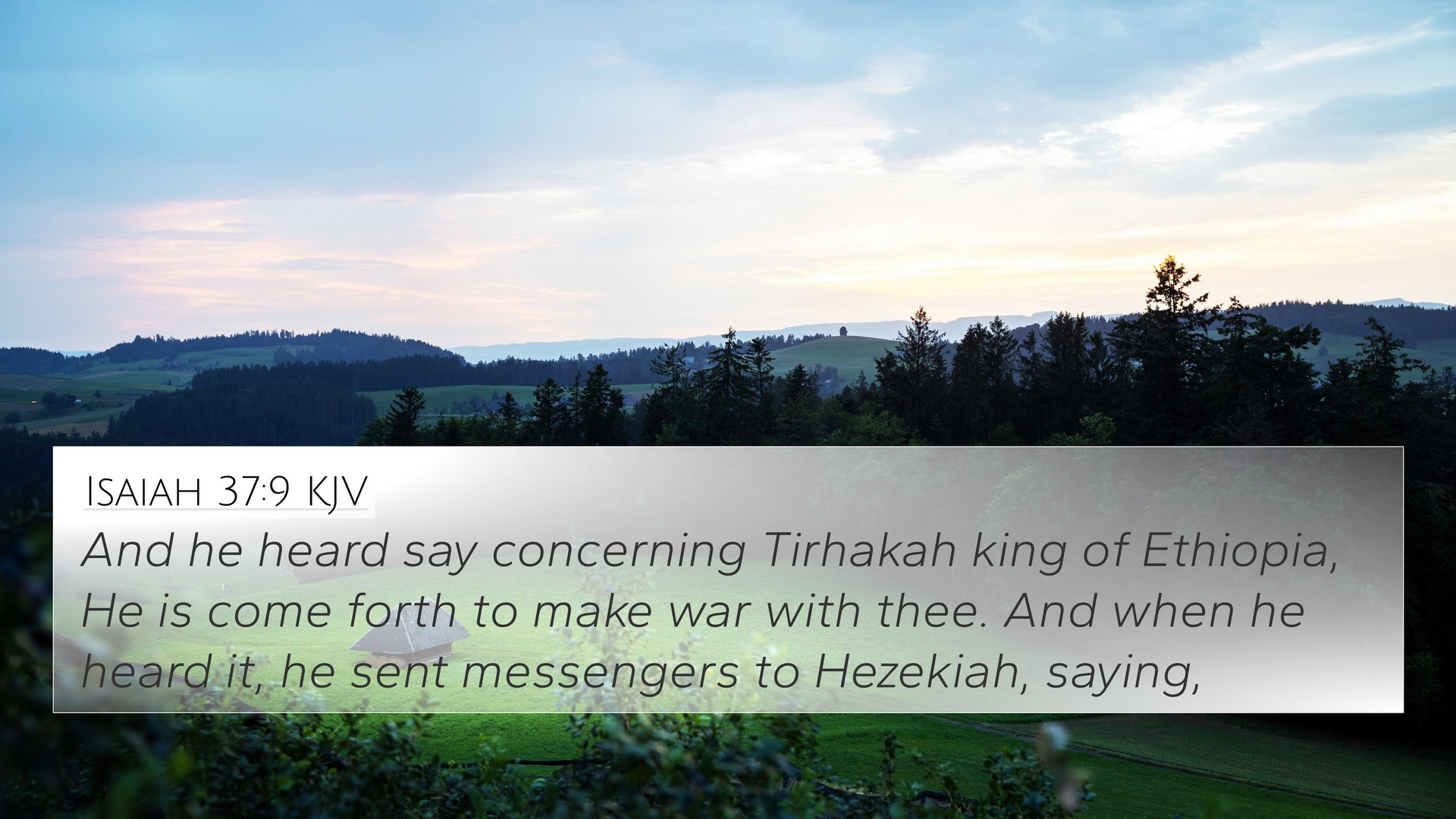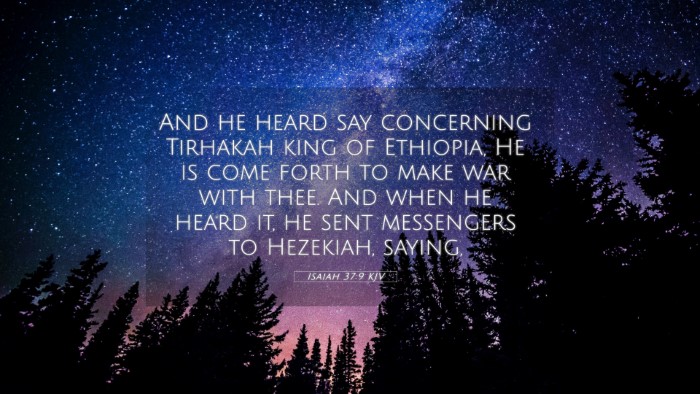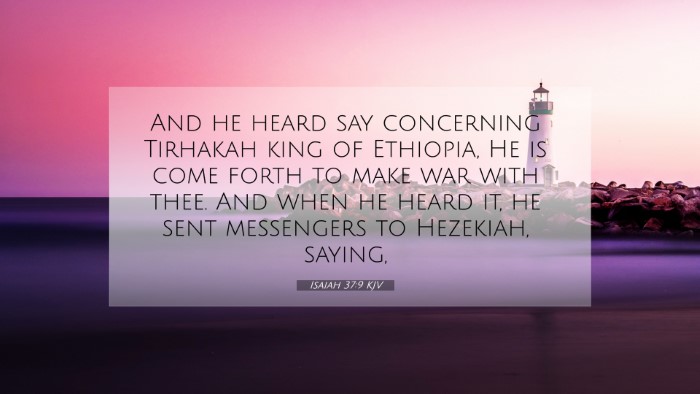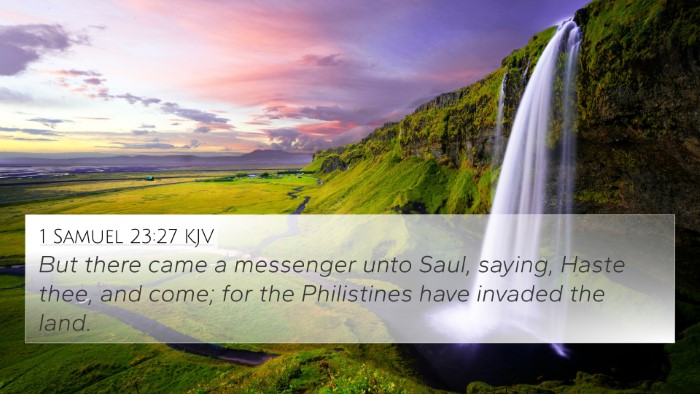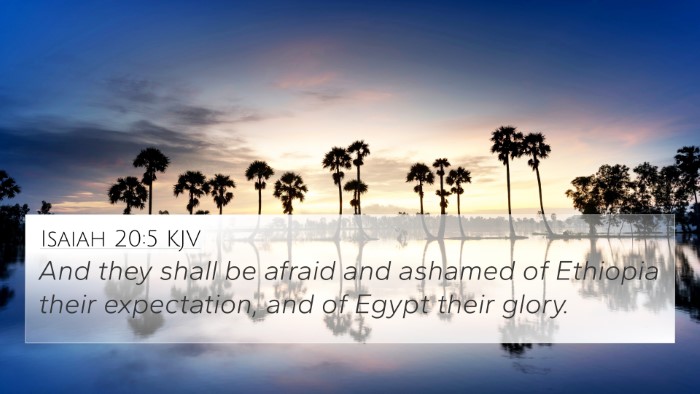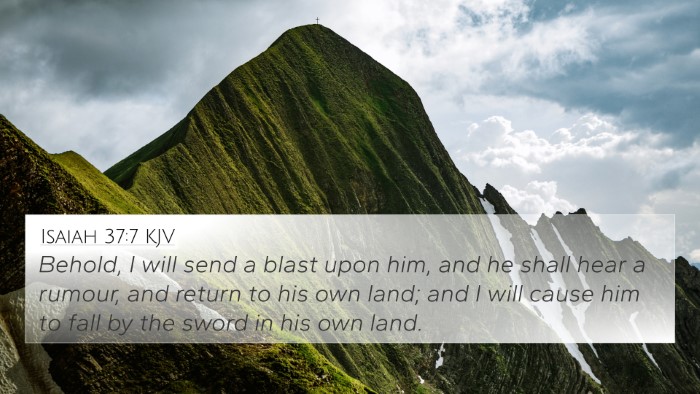Understanding Isaiah 37:9
Isaiah 37:9 reads: "And when he heard say of Tirhakah king of Ethiopia, Behold, he is come out to fight against thee: he sent messengers to Hezekiah, saying," This verse occurs within the narrative of Hezekiah's challenge against Sennacherib, king of Assyria. It reflects themes of fear, political intrigue, and divine intervention as portrayed throughout the Book of Isaiah.
Verse Context and Theme
This verse sits within a broader context where the Assyrian army threatens Jerusalem. Hezekiah, hearing of the approach of Tirhakah, king of Ethiopia, is in a situation fraught with anxiety and uncertainty.
The interruption by Tirhakah's involvement heightens the tension, indicating shifting political alliances and the complexity of regional power dynamics.
Combined Insights from Commentaries
Matthew Henry's Commentary
Matthew Henry asserts that the involvement of the king of Ethiopia serves as a reminder of God's ability to use various means to influence events for His people. The mention of Tirhakah symbolizes an external threat that could either intimidate or galvanize Hezekiah’s faith in God's promises of deliverance.
Albert Barnes' Notes
Albert Barnes provides a focus on the historical backdrop of this narrative, emphasizing that the tyrannies of the Assyrians stirred up a collective resistance among surrounding nations. He sees Tirhakah's movement as a divine providence allowing the people of Judah a chance to seek help and reflect on their fidelity to God amidst despair.
Adam Clarke's Commentary
Adam Clarke highlights the narrative's significance in illustrating the political interactions of the time. He emphasizes that while Sennacherib is a powerful adversary, the response of Hezekiah should be an example of reliance on God amidst overwhelming odds. Tirhakah is introduced as both a potential helper and a disruption of Sennacherib's plans.
Bible Cross-References
This verse connects with several other Biblical passages that explore similar themes:
- Isaiah 36:1 - The earlier chapter introduces the Assyrian siege, setting the stage for Hezekiah’s potential responses.
- 2 Kings 19:9 - Provides parallel details about the predicament, enhancing the understanding of Hezekiah's choices.
- Isaiah 37:10 - The direct following verse continues the narrative of Sennacherib's intimidation tactics against Jerusalem.
- 2 Chronicles 32:9 - Offers additional context to the siege and Hezekiah's efforts to fortify Jerusalem against Assyrian threats.
- Isaiah 20:1 - Discusses Tiglath-pileser, showing previous occurrences of political turmoil in the region.
- Psalm 46:1-2 - A verse reflecting on God as a refuge, resonating with the themes of security during times of distress.
- Isaiah 31:1 - Warns against reliance on human alliances, encouraging trust in divine strength over military power.
- Jeremiah 46:1-2 - Contains prophecies related to Egypt, further clarifying the political landscape of the region.
- Job 5:12 - Highlights God’s sovereignty over the plans of the wicked, similar in theme to God's interventions in Hezekiah's time.
- Matthew 24:6 - Jesus speaking about wars and rumors may echo the conditions faced by the Judahites in Isaiah's time.
Inter-Biblical Connections
Linking this verse with others provides an invaluable perspective on the continuity of God's deliverance throughout the scriptures:
- Identifying connections between Old and New Testament: The theme of deliverance continues into the New Testament as believers face persecution, echoing the experiences of Hezekiah.
- Cross-referencing Psalms with New Testament teachings: The Psalms often reflect upon God's saving acts, akin to Hezekiah's experience.
- Comparative study of Pauline epistles: Paul's messages on hope in trials resonate deeply with Hezekiah's plea for divine aid.
Thematic Bible Verse Connections
The situation surrounding Hezekiah and Tirhakah illuminates larger themes within scripture, such as:
- Faith in Adversity: How to maintain trust in God when faced with overwhelming circumstances.
- Political Intrigue and God's Sovereignty: The intersection between human plans and divine purposes in the affairs of nations.
Conclusion
Isaiah 37:9 serves as a pivotal verse within the narrative of Judah's resistance against the Assyrian forces. The insights from various public domain commentaries elucidate this verse's significance, demonstrating its relevance through cross-references and thematic connections throughout scripture. These interpretations not only provide clarity on this specific passage but enrich the overall understanding of God's interventions and assurances to His people during times of distress. For those engaged in Bible study, utilizing cross-references and thematic analysis aids in uncovering the intricacies of Biblical texts and enhances spiritual growth.
